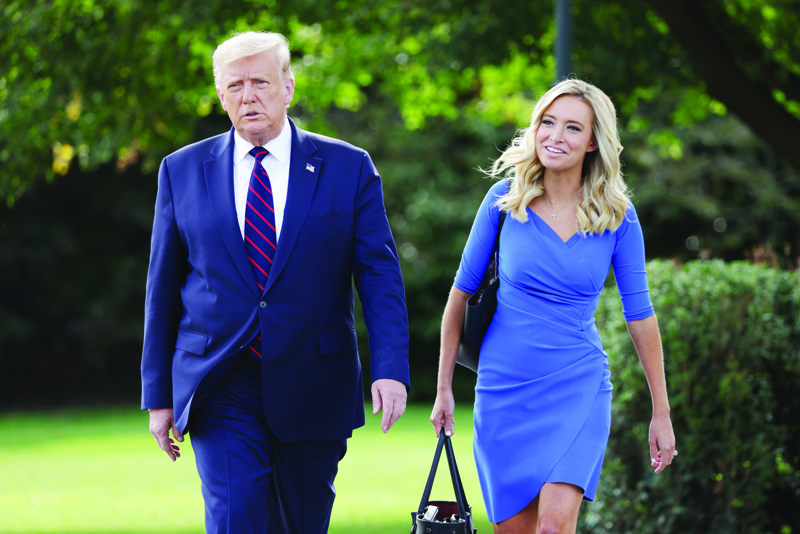
PHILADELPHIA: US President Donald Trump said Tuesday that a coronavirus vaccine may be available within a month -- an acceleration of even his own optimistic predictions -- but added that the pandemic could go away by itself. "We're very close to having a vaccine," he told a town hall question-and-answer session with voters in Pennsylvania aired on ABC News. "We're within weeks of getting it you know -- could be three weeks, four weeks," he said.
Only hours earlier, speaking to Fox News, Trump had said a vaccine could come in "four weeks, it could be eight weeks." Democrats have expressed concern that Trump is putting political pressure on government health regulators and scientists to approve a rushed vaccine in time to help turn around his uphill bid for reelection against challenger Joe Biden on November 3.
Experts including top US government infectious diseases doctor Anthony Fauci say vaccine approval is more likely toward the end of the year. At the ABC town hall Trump was asked why he'd downplayed the gravity of the Covid-19 pandemic, which has now killed close to 200,000 people in the US. Trump replied by saying: "I didn't downplay it. I actually, in many ways, I up-played it in terms of action." But Trump himself told journalist Bob Woodward during taped interviews for the new book "Rage" -- published Tuesday -- that he had deliberately decided to "play it down" to avoid alarming Americans.
'Herd mentality'
Returning to one of his most controversial views on the virus, that has ravaged the economy and which government scientists say will remain a danger for some time, Trump insisted "it is going to disappear." "It would go away without the vaccine but it's going to go away a lot faster with it," he said. Challenged about how the virus would go away by itself, he said "you'll develop like a herd mentality," apparently meaning the concept of herd immunity, when enough people have developed resistance to the disease to effectively stop transmission.
"It's going to be herd developed and that's going to happen. That will all happen but with a vaccine, I think it will go away very quickly. But I really believe we're rounding the corner," he said. The president, who is rarely seen wearing a mask in public and long refused to push Americans to adopt the habit, said "a lot of people don't want to wear masks and people don't think masks are good."
Asked what people he meant, Trump answered: "Waiters." "They come over and they serve you and they have a mask," he said. "I saw it the other day when they were serving me and they're playing with the mask. I'm not blaming them. I'm just saying what happens: They're playing with the mask. So the mask is over, and they're touching it, and then they're touching the plate, and that can't be good."
Polls show that a majority of Americans disapprove of Trump's handling of the health crisis. The latest NBC News|SurveyMonkey Weekly Tracking poll Tuesday found that 52 percent of adults do not trust Trump's statements about an upcoming coronavirus vaccine, compared to 26 percent who do. Racial minorities accounted for 78 percent of Covid-19 deaths under the age of 21 in the United States between February and July, a government report said Tuesday.
Out of 121 deaths among under-21s, 45 percent were among Hispanics, 29 percent among blacks and four percent among American Indians or Alaskan Natives, according to the study by the Centers for Disease Control and Prevention (CDC). Together, these groups represent 41 percent of the US population under 21. Overall, mortality among children and youths is far lower than adults: the CDC identified 392,000 cases in the time period, which was eight percent of the total figure, and only 0.08 percent of all deaths.
Under-21s make up 26 percent of the US population. But the study does offer further proof that children and adolescents are not immune to the virus and a post-viral condition called multisystem inflammatory syndrome in children (MIS-C), which was also included in the research. As other investigations have previously established, boys and men are at greater risk and accounted for 63 percent of deaths in the current study. Three-quarters of the deaths involved people with at least one underlying condition including chronic lung disease, asthma, obesity, neurologic and developmental conditions, and cardiovascular conditions.
Twelve of the children who died were less than one-year-old, while 18 to 20-year-olds accounted for nearly half of the deaths. The study, which was a part of the CDC's "Morbidity and Mortality Weekly Reports" that are closely followed by health officials and professionals, was delayed in its publication following pressure by officials in the Trump administration, according to Politico.
The news site reported that a Trump appointed official had objected to the inclusion of the term "pediatric population" to describe those under the age of 21. The administration has consistently emphasized the need for children to return to in-person learning at schools. - AFP
.jpg)



